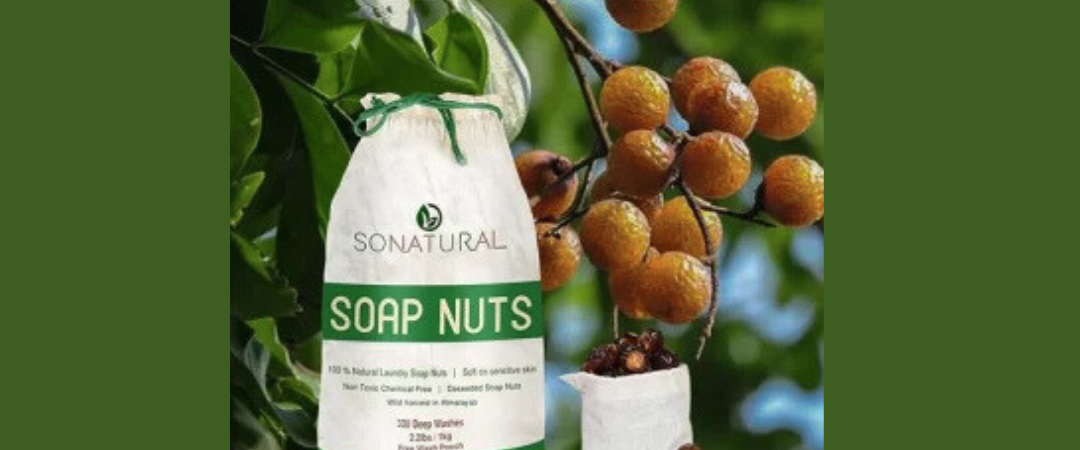How to Reuse and Compost Organic Soap Nuts After Laundry | Eco-Friendly Guide

More households are switching to organic soap nuts as a natural and sustainable alternative to chemical detergents. These tiny dried berries, rich in natural saponins, act as effective cleaning agents for clothes while being gentle on the environment. But many people wonder what to do with used soap nuts after laundry. Should you throw them away, or can they be reused and composted?
This guide explores how you can extend the life of your soap nuts, reuse them efficiently, and compost them to return nutrients to the soil. By following these practices, you can make your laundry routine both eco-friendly and cost-effective.
Understanding How Soap Nuts Work
Soap nuts (also called “soap berries”) contain saponin, a natural surfactant that cleans clothes when released in warm water. During laundry, soap nuts release this compound gradually, which means a single batch can be reused several times. Once the saponins are depleted, they become soft, grayish, and no longer effective for cleaning. At that stage, they are perfect for composting.
How Many Times Can Soap Nuts Be Reused?
One of the main benefits of using laundry soap nuts is their reusability. Typically:
-
Warm water washes: 3–4 loads per batch.
-
Cold water washes: up to 6 loads (since saponins release more slowly).
-
Signs of depletion: When the shells turn mushy, pale, and no longer lather, it’s time to compost them.
Reusing them correctly maximizes value and reduces waste.
Step-by-Step Guide to Reusing Soap Nuts After Laundry
1. Collect and Store After Each Wash
After a cycle, remove the muslin bag of soap nuts for laundry and let them dry completely. Storing them damp can lead to mold. Drying them ensures they are ready for the next wash.
2. Keep Track of Usage
A simple way is to label a jar or container and note how many washes each batch has gone through. This helps you know when they are near the end of their cleaning power.
3. Reuse for Non-Laundry Cleaning
When the saponin content starts to weaken, you can still extract more by boiling them in water to make nut soap laundry liquid. This mild solution works well for cleaning floors, windows, or even as a natural dish soap.
4. Make a Gentle Body or Pet Wash
Partially used laundry soap nuts can also be simmered in hot water and strained into a liquid cleanser. Because they’re chemical-free, they’re safe for washing delicate fabrics, baby clothes, or even as a pet shampoo alternative.
Composting Organic Soap Nuts: Zero-Waste Disposal
Once soap nuts are fully exhausted, they should not go into the trash. Since they are 100% natural and biodegradable, composting is the most eco-friendly way to dispose of them.
1. Check if They’re Ready
The shells should be thin, soft, and almost colorless. If no suds form when boiled in water, they’re ready for composting.
2. Add to Your Compost Bin or Pile
Simply toss the used shells into your compost. Their organic matter breaks down easily, adding nutrients to the soil.
3. Balance Carbon and Nitrogen
Soap nuts are considered green material (nitrogen-rich). Balance them with “brown” compost items like dried leaves, cardboard, or paper to maintain a healthy compost ratio.
4. Use Compost for Gardening
In a few months, your compost enriched with soap nut residue will become a nutrient-rich fertilizer. It works especially well for flowers, vegetables, and fruit plants.
Additional Eco-Friendly Uses Before Composting
Instead of directly composting after laundry, consider these creative ideas:
-
Natural Insect Repellent: Used shells can be boiled in water and sprayed on plants to deter pests.
-
DIY Household Cleaner: Blend shells into a liquid cleaner for countertops and kitchen surfaces.
-
Handmade Shampoo: Combine soap nut decoction with herbs like neem or shikakai for a natural hair wash.
These ideas ensure every ounce of saponin is used before the shells return to the earth.
Why Composting Soap Nuts Matters
Composting used soap nuts aligns with a circular, zero-waste lifestyle. Unlike synthetic detergents that pollute waterways, soap nuts return harmlessly to the soil. By composting:
-
You reduce household waste.
-
You create organic fertilizer at no extra cost.
-
You contribute to a sustainable laundry routine.
Expert Tips for Maximum Benefits
-
Use a Small Muslin Bag: Keeps shells contained and easier to reuse.
-
Switch to Liquid Soap Nut Extract: Perfect for cold washes and extends usage.
-
Combine With Essential Oils: Add a few drops of lavender or tea tree oil for fragrance and antibacterial benefits.
-
Don’t Overload the Washer: More clothes require more active saponin; adjust batch size accordingly.
Conclusion
Knowing how to reuse and compost organic soap nuts empowers you to get the most value from this natural detergent while supporting a sustainable lifestyle. By extending their use, repurposing them for household cleaning, and finally composting them, you create a zero-waste laundry cycle that benefits both your home and the planet.
Switching to soap nuts laundry detergent is more than an eco-choice; it’s a commitment to a cleaner, greener future.
FAQs
Q1: How many times can I reuse soap nuts for laundry?
You can typically reuse them 3–6 times, depending on water temperature and load size.
Q2: Can I compost soap nuts directly after laundry?
Yes, once they stop producing suds, they can be added to compost as organic waste.
Q3: Do soap nuts work better in hot or cold water?
They release saponin faster in hot water but last longer in cold washes.
Q4: Can I use soap nuts for cleaning other than laundry?
Yes, boiled soap nuts create a natural cleaning liquid suitable for dishes, floors, and windows.
Q5: Are soap nuts safe for sensitive skin?
Absolutely. They are hypoallergenic, making them ideal for babies and people with skin sensitivities.







